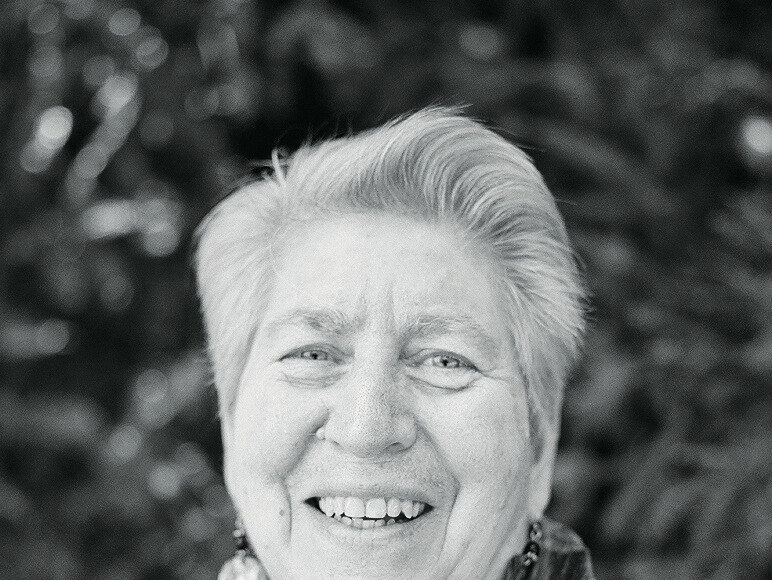With her pioneering work in Feminist Studies over the last 40 years, and her role as a Distinguished Professor Emerita at UCSC, Bettina Aptheker is a famed academic. The title of her latest book, Communists in Closets: Queering the History 1930s-1990s, might make you think of academia, too, and its focus on institutional analysis and the surveying of eras.
But Aptheker doesn’t think like an academic, and her new book—like its predecessor, the memoir Intimate Politics: How I Grew Up Red, Fought for Free Speech and Became a Feminist Rebel—doesn’t read like an academic book. Because what Aptheker really cares about is telling people’s stories.
Several of the book’s chapters are named for the LGBTQ+ members of the American Communist Party who she spent years researching, and you can feel the connection that Aptheker (herself a closeted Communist for many years) feels to them in her prose, like in the chapter on Harry Hay (subtitled “A Communist, Radical Faerie in a Revolutionary Quest”) where she writes, “I sat in the archives with Harry Hay for weeks. I first ‘met’ him at the ONE Archives in Los Angeles, then in the San Francisco Public Library, where the bulk of his papers are housed, and then in the Manuscript Division of the New York Public Library, where I listened to hours and hours of his oral history on cassette tapes, recorded by gay historian John D’Emilio. I felt myself transported into his life, in ways that deeply resonated with both my understanding of the [Communist] Party, and what seemed to be his sheer joyous open heart.”
This research often led to some unexpected developments, like when a former student of Aptheker’s now working as an archivist at Smith College reached out to her because she knew Aptheker was researching closeted members of the Communist Party (which officially banned gays and lesbians from 1938 to 1991). That’s how Aptheker discovered Elizabeth “Betty” Millard, a queer Communist who wrote the groundbreaking 1948 Marxist-feminist book Woman Against Myth—and has her own chapter in the new book. After finding out it was Millard’s niece Olivia who had donated her aunt’s papers to Smith College, Aptheker tried in vain to find her—and finally gave up.
“And then I get a phone call from Olivia Millard,” Aptheker tells me. “So I answer it—and she lives in Watsonville. She’s an activist, and she was calling to ask me for something that she needed. I’m holding the phone like, ‘Oh, my gosh.’ So I said, ‘Yeah, I’ll help you. But listen, your aunt was Betty Millard.’ She says, ‘Oh, yes.’ And I told her about the book I was writing, and she said, ‘Come on over to the house.’ I mean, it’s 20 minutes away. So I went to her house multiple times. And she had saved a lot of material from Betty that she didn’t put in the archive. She said, ‘You can have it. You can do whatever you want with it.’”
The people who inspired Aptheker’s book were her people—and she understood the need for it after what she thought would be a small event in 2010 at NYU, where she was delivering a paper on the subject of gays and lesbians in the Communist Party.
“And all these people showed up,” she says. “I mean, the place was packed; they were all either ex-Communists, Socialists, ex-Socialists, radicals. A lot of them were gay or lesbian. And they started talking. I was standing up at the podium, I was just taking notes. They were talking amongst themselves. This happened, that happened—‘No, no, it was this way.’ They’re arguing, because Communists have to argue. And then they came up to me afterwards and said, ‘This is a book. You have to write the book.’”
Bettina Aptheker will read from and discuss “Communists in Closets” at 7pm on Tuesday, Oct. 25 at the Cowell Ranch Hay Barn at UCSC. Presented by the Humanities Institute at UCSC and Bookshop Santa Cruz, the event is free but space is limited, so register at bookshopsantacruz.com. Masking is required.













Not specific for the two cases mentioned in an otherwise solid review: Who the Hell are Harry Hay and Betty Millard? (Why are they important to the CPUS?)
Not specific for the two cases mentioned in an otherwise solid review: Who the Hell are Harry Hay and Betty Millard? (Why are they important to the CPUS?)
Huh?